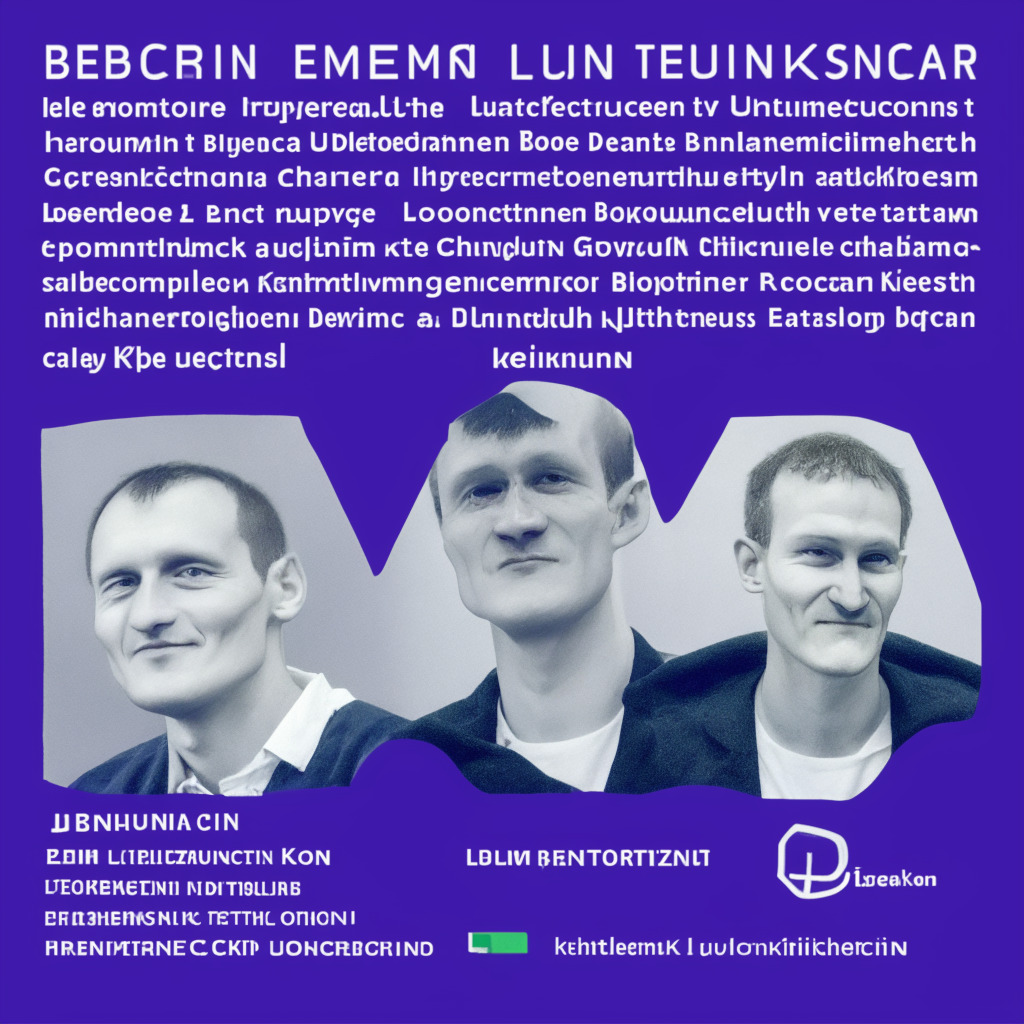“Ethereum’s co-founder, Vitalik Buterin, discussed potential changes to Ethereum’s staking system, assessing a range of protocols and expressing concerns about the centralization of power among staking providers. He proposed mechanisms to enhance safety and decentralization of liquid staking and recommended revising certain procedures.”
Search Results for: Buterin
Decoding Vitalik Buterin’s Privacy Pool Concept: Navigating Blockchain Privacy & Regulatory Compliance
Ethereum co-founder Vitalik Buterin’s proposed privacy pool concept focuses on combining blockchain privacy and regulatory compliance, sparking meaningful discussion in the crypto world. However, concerns over unclear compliance framework, implementation struggles, and acceptance issues remain to be addressed.
Ethereum Co-founder Buterin’s Big Money Moves: Strategizing or Cash-Out?
“Ethereum’s co-founder, Vitalik Buterin, has reportedly been moving large amounts of ETH to various exchanges. Total transfers in September reach $3.94 million worth of ETH. Despite prices falling, Ether’s trading volume noticeably increases, while Ethereum’s gas usage sees an 8-month low.”
Massive Ethereum Movements: Buterin’s Wallet Activity Sparks Market Speculation
“A series of large Ethereum transactions linked to Vitalik Buterin have been detected, including a 400 ETH transfer to Coinbase. These deposits, ranging over 10 days and amounting to nearly $3.94 million, have sparked speculation about a potential sell-off and its impact on the ETH price.”
Pros and Cons of Vitalik Buterin’s “Privacy Pools”: Balancing Blockchain Transparency and Anonymity
“Vitalik Buterin co-authored a paper exploring a potential solution to the inherent privacy leak in blockchain, balancing privacy and compliance. The proposed synthesis of zero-knowledge proofs with “Privacy Pools” attempts to obscure crypto users’ blockchain history without associating with illicit activities. Critics, however, question this method’s legal and practical efficacy.”
Unraveling the Impact of Vitalik Buterin’s Million-Dollar ETH Transfer
“The move by Ethereum’s co-founder Vitalik Buterin to transfer $1 million worth of ETH to Coinbase has sparked intrigue and speculation within the crypto fraternity. Amid market volatility, this transaction raises questions about the influence of market moguls and the essence of cryptocurrencies, underscoring the sector’s sensitivity, volatility, and commitment to freedom of trade.”
Ethereum’s Buterin Highlights Crypto Values in Mainstream Social Media: A Boon or a Bane?
Co-founder of Ethereum, Vitalik Buterin, discusses how the Community Notes tool used by a platform ‘X’, embodies ‘crypto values’. This tool has been successful in countering misinformation. The merge of social media and the blockchain could potentially create a transparent, decentralized control system, or allow powerful individuals to manipulate the system.
Vitalik Buterin’s Critique of Crypto Entrepreneurship and Future Potential of AI Integration
Ethereum co-founder Vitalik Buterin criticized entrepreneur Sam Bankman-Fried’s view of crypto as purely a business opportunity after the implosion of his digital asset exchange, FTX. Buterin highlighted crypto’s ties to more than monetary gains, his reservations about Bankman-Fried, and the potential role AI could play in enhancing human capabilities across industries.
Vitalik Buterin Probes Worldcoin’s ‘Proof-of-Personhood’ Amid Conceptual Hurdles
Ethereum’s co-founder, Vitalik Buterin, has voiced his concerns about Sam Altman’s new crypto project, Worldcoin. Buterin scrutinized Worldcoin’s novel ‘Proof-of-Personhood’ system, expressing apprehensions on privacy, accessibility, centralization, and security issues related to iris scanning technology known as ‘World ID.’
Ethereum’s Vitalik Buterin Deliberates Over Human Identity Verification Systems and their Role in Blockchain Security
Ethereum Co-founder Vitalik Buterin responds to Worldcoin’s launch of a decentralized human identity verification system, viewing it as integral in tackling online spam and power centralization. Buterin also stresses the need for privacy, accessibility, transparency, and security in such identity solutions to prevent wealth concentration in potentially hostile hands. Despite potential threats to privacy and system security, Buterin promotes hybrid approaches to proof of personhood, warning of a future intertwined with AI and the need for careful blockchain navigation.
Vitalik Buterin’s NFT Portrait and NeoPets’ Shift: A Dive into Crypto’s Changing Landscape
“NFTs are the current rage in crypto, with significant transformations such as Ethereum co-founder Vitalik Buterin’s portrait being sold as an NFT. However, the lack of clarity over what’s permissible affects transparency as exemplified by the OpenSea case.”
Future Bitcoin Prospects: Vitalik Buterin Advices Better Scalability Amid Controversy
Ethereum’s co-founder, Vitalik Buterin, recently debated Bitcoin’s future prospects with Eric Wall and Udi Wertheimer, well-known Bitcoin enthusiasts. The conversation centered around Bitcoin’s scalability, with Buterin suggesting a multi-pronged approach involving various layer-2 solutions and improvements to Bitcoin’s base layer. The suggested introduction of zero-knowledge rollups, a technology potentially impacting Bitcoin positively, sparked mixed reactions within the community.
Ethereum Foundation & Vitalik Buterin’s Massive ETH Transfers: Crash Fears vs Market Dynamics
The Ethereum Foundation recently dumped 15,000 ETH, raising concerns among the crypto community, while Ethereum creator Vitalik Buterin transferred 200 ETH to Kraken exchange. Despite fears of a possible price dip, ETH’s price increased 3% in the last 24 hours.
Ethereum’s Divergent Co-Founders: Lubin vs Buterin in Shaping the Future of Finance
Ethereum co-founders Joe Lubin and Vitalik Buterin took differing paths, with Lubin focusing on commercial aspects through ConsenSys while Buterin led a more idealistic nonprofit approach. As Ethereum development evolved, Lubin envisions it as a potential trust foundation supporting global financial infrastructure, but acknowledges challenges and rearchitecting global economy will take time.
Ethereum Decline: Diving into the Factors Behind ETH’s Recent Dip
“The recent 8.2% decline in Ethereum (ETH) attributes to increased coin issuance, significant sales by creator Vitalik Buterin, and the underperforming ETH futures ETF. Despite significant network developments, the uncertainty of Ethereum’s monetary policy and increased supply by 30,064 ETH has stirred negative sentiments among crypto enthusiasts.”
Ethereum Staking Surge Sparks Centralization Concerns: A Deeper Dive into JPMorgan’s Analysis
The article reveals Ethereum’s staking growth is leading to increased centralization, with five entities controlling most staking activities. This generates risks like potential single points of failure and lower staking yields. Analysts suggest this centralization might challenge blockchain networks’ decentralization and trustlessness principles.
Cybersecurity vs User Experience: Harmonizing the Dual-edged Sword of the Crypto Space
The recent SIM-swap scams targeting Friend.tech users signify a trade-off between user experience and enhanced security in the crypto-space. Such scams, exploiting cell phone numbers to loot the victim’s accounts, contributed to heightened cybersecurity concerns. Security firms suggest enforcing two-factor authentication and removal of phone numbers from social media accounts as potential solutions.
Unraveling the Paradox of Increased Decentralization: The Optimism Network’s Stride and Binance’s Unexpected Move
The Optimism network has launched its testnet version of a fault-proof system aimed at increasing the efficiency and decentralization of the Superchain. Typically reliant on centralized sequencers, the new system offers modular options to prevent fraud. However, co-founder of Ethereum, Vitalik Buterin, asserts the importance of user-submitted fraud proofs to maintain true decentralization.
DOJ vs. Former FTX Executive: A Crypto Legal Showdown and its Potential Impact
“The upcoming trial of former FTX executive, Sam Bankman-Fried, aims to unravel FTX’s approach in managing customer assets, a key factor for the case’s outcome. Meanwhile, Ethereum co-founder, Vitalik Buterin, expresses concerns about a possible monopoly by decentralized autonomous organizations (DAOs), highlighting potential vulnerabilities in the blockchain ecosystem.”
Ethereum Co-founder’s Warning: DAOs and Vulnerabilities in Staking Pools
In his recent blog post, Ethereum co-founder Vitalik Buterin expressed concerns over Decentralized Autonomous Organizations (DAOs) dominating liquid staking pools, potentially opening doors to network vulnerabilities. He emphasizes the importance of engaging with various liquid staking providers to mitigate systemic risks.
Unmasking Filecoin: Blockchain Sleuths, Dubious Activities, and Investor Deception
Investigator @BoringSleuth’s report pointed out inconsistencies in the source of blockchain initiative, Filecoin’s ICO. It suggests a potential scheme intended to deceive investors by mimicking widespread investor interest. The verity of these claims remains unproven but they have raised important questions regarding transparency in the crypto realm.
Blockchain’s Paradox: The Clash between Potential and Vulnerability in Light of Recent Mixin Network Hack
The recent hack on Mixin Network, resulting in a loss of approximately $200 million, highlights the vulnerability of blockchain technology. Despite its potential for speed, transparency, and security, hackers were still able to exploit weaknesses, leading to an immediate halt in withdrawals and deposits. It underscores the imperative for stronger defenses against cyber threats in blockchain technology.
Ethereum’s Uptick Dilemma: Past Expectations Vs. Future Pivots
Despite witnessing a 36% year-to-date price increase in 2023, Ethereum’s price lags significantly behind Bitcoin’s, sparking concern among investors. Even protocol upgrades and the shift to Proof-of-Stake consensus couldn’t sustain Ethereum’s price rise. However, the proposed Ether ETF by ARK Invest and 21Shares, along with Canto’s migration to Ethereum’s layer-2, indicate potential catalysts for recovery.
Mark Cuban’s $870,000 Loss: A Cautionary Tale Against Crypto Phishing Scams
Dallas Maverick owner, Mark Cuban, lost approximately $870,000 in various tokens due to a phishing attack. Phishing attacks in the crypto industry mislead users into exposing sensitive information or downloading malicious software, leading to significant financial losses. A counterfeit MetaMask wallet application initiated the fraud. Users are advised to exercise extreme caution, verify sources and conduct due diligence to avoid such incidents.
Crypto Galore: El Salvador’s Bitcoin Education to Binance’s Legal Tussle – the Week in Review
“The week in the crypto world was replete with notable developments from El Salvador’s Bitcoin literacy initiative to security issues identified with Telegram Bots by Certik. Meanwhile, high-profile legal battles and regulatory changes kept the industry on its toes. Despite challenges, tech giants like Sony and PayPal advanced their blockchain and crypto endeavors, emphasizing the market’s enduring dynamism.”
Ethereum’s Holseky: Innovation Towards Scalability or a Step Towards Centralization?
The Ethereum blockchain is introducing Holesky, the largest test network, set to resolve scalability issues before projects go live. Despite its high potential and efforts in scaling and energy use, concerns remain about Ethereum’s centralized nature and financial barriers for individual validators.
Hong Kong’s Crypto-Friendly Climate: Sustainable Support or Strategic Risk?
In the Web3 Transitions Summit, Vitalik Buterin, co-founder of Ethereum, urges caution for those considering establishing crypto operations in the amicable environment of Hong Kong. He demands certainty about city-state’s ability to maintain the harmony between traditional finance and emerging financial trends amid potential future regulatory shifts.
The Dance of Crypto Regulation: Analysis of Hong Kong Stability and German Innovation
“In the blockchain and cryptocurrency domain, global jurisdictions are striving to balance innovation fostering and investor protection. With Hong Kong and Germany as examples, this article emphasizes the importance of stability, transparency in regulation, and innovative dynamism for robust crypto markets.”
Hong Kong and Crypto: Friend or Foe in the Making? Debating the City’s Crypto-Future
“Hong Kong is solidifying its position in the cryptocurrency global stage, with a warm reception to crypto projects and a stable policy framework that fosters cryptocurrency growth. However, concerns exist about the long-term stability of this friendliness amid potentially unstable regulatory shifts, political unrest, and other unforeseen events.”
Decentralized Stablecoins: The Future Star or Centralization Roadblock of the Crypto Market?
Rune Christensen, co-founder of DeFi pioneer MakerDAO, foresees decentralized stablecoins dominating the crypto market while centralized ones may have the function of connectors with the traditional financial system. In the rapidly changing cryptocurrency landscape, regulation-friendly procedures and addressing centralization issues are critical in leveraging the potential of decentralized stablecoins.
Revamping Ethereum’s Staking Infrastructure: Is SSV.network the Solution to Pool Decentralization and Key Security?
“SSV.network, in partnership with the Ethereum Foundation, recently launched its mainnet aiming to decentralize Ethereum staking pools. Leveraging Distributed Validator Technology, it aims to increase validator resilience, enhance private key security, and minimize the risks of validator downtime.”
SEC Slaps Stoner Cats NFT with $1M Fine: A Cautionary Tale for Crypto Securities
The company behind Stoner Cats NFTs has been fined $1 million by the US SEC for organizing an unlicensed offering of cryptoasset securities. It collected $8 million to finance an animated series but found itself subject to legal repercussions highlighting the importance of legal accountability in security transactions, especially in the burgeoning NFT market.































